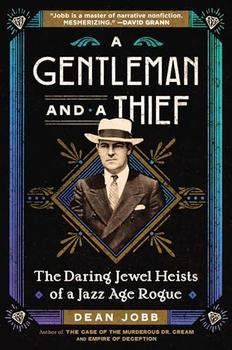Summary | Excerpt | Reading Guide | Reviews | Beyond the Book | Readalikes | Genres & Themes | Author Bio

The Daring Jewel Heists of a Jazz Age Rogue
by Dean Jobb
When the Cosdens hosted a late-night party in early September, the prince and his aides commandeered one of the Burden cars and drove over. It was there, in the midst of what one press report termed a "small but jolly" gathering, that Gibson met the prince. Gibson also caught a glimpse of the Mountbattens—the "dark, handsome naval officer," he recalled, and the "lovely Lady Mountbatten, a pearl of international society"—as they chatted with other guests.
The party was the kind of modest, laid-back gathering the prince had been craving since his arrival. This was a holiday, not an official visit; his only commitment was to attend an international polo championship being staged on Long Island, to cheer on the British team. Edward had been traveling the world as Britain's goodwill ambassador—cutting ribbons, making speeches, and shaking hands to shore up wartime alliances and drum up trade deals. He wanted a break. "He is here to play," one of his aides, Tommy Lascelles, reminded the reporters and photographers documenting his every move. "His royal highness is entitled to some time to enjoy himself."
The prince was the first of what would become a twentieth-century phenomenon: the royal celebrity. And he was furious to discover that American journalists were more aggressive and relentless than their British counterparts. "These Yank pressmen are b––s," he griped to his private secretary in unroyal language. "One does resent their d––d spying." The most eligible bachelor on the planet had turned thirty in June, and the American papers were obsessed with the notion that "Prince Charming" had come to their shores in search of a bride. "Would you marry an American girl if you fell in love with one?" was one of the first questions a reporter fired at him when he reached New York on board the liner SS Berengaria. And there were plenty of candidates eager to meet him or to catch his eye. ARMY OF LOVELY WOMEN SEEK HIS PRINCELY SMILE, shouted a headline in the New York Daily News. Hundreds of women "forgot decorum," as one journalist put it, and stood on their seats at Belmont Park to catch a glimpse of him as he watched the thoroughbred races from the judges' box.
When Gibson first spotted the prince at the Cosdens' party, an older woman was monopolizing the guest of honor's time, no doubt extolling the beauty and virtues of a daughter or niece. The prince had been listening politely, a cocktail in his right hand and his left arm gracefully folded against the small of his back. But it was not the woman vying for the prince's attention that caught Gibson's eye; it was the expensive jewelry adorning the necks and wrists and fingers of so many others. "I'm a judge of that sort of thing," he admitted, "and I couldn't help but admire what they wore." Years later, he still remembered an antique Chinese piece he spotted that night, fashioned from hand-hammered gold and set with a single diamond.
Someone in the prince's group suggested they "get away from the women" for a while. Gibson piped up and suggested "a sortie to gayer places," that they drive into Manhattan and "see the town." Gibson offered to be their guide.
A couple of the men surrounding the prince objected, and the idea was dropped. But Edward was not willing to pass up the opportunity to sample New York's nightlife. "Wales does things spontaneously and when he chooses," noted one of the American journalists covering his visit. "That is part of his charm." The prince took his new acquaintance aside. For once, he was free of the reporters who relentlessly shadowed him. This was his chance to see New York as a tourist, not as a future king.
"Dr. Gibson," he asked, "is that little lark still on?"
* * *
"Hello, suckers!"
Those were the first words most patrons heard after they climbed a flight of stairs and slipped inside one of New York's most famous speakeasies, a greeting shouted over the din of the crowd by a brash blue-eyed blond woman who was clearly in charge. The awning over the entrance door below, on West Forty-Fifth Street, identified it as the El Fey Club, but everyone in New York called it Texas Guinan's place. Mary Louise Cecilia Guinan was a former vaudeville and movie star who had reinvented herself as a nightclub manager. Texas-born, which explained her nickname, she had appeared in The Gun Woman, Code of the West, The Wildcat, and dozens of other westerns.
Excerpted from A Gentleman and a Thief by Dean Jobb. Copyright © 2024 by Dean Jobb. Excerpted by permission of Algonquin Books. All rights reserved. No part of this excerpt may be reproduced or reprinted without permission in writing from the publisher.
The low brow and the high brow
Click Here to find out who said this, as well as discovering other famous literary quotes!
Your guide toexceptional books
BookBrowse seeks out and recommends the best in contemporary fiction and nonfiction—books that not only engage and entertain but also deepen our understanding of ourselves and the world around us.